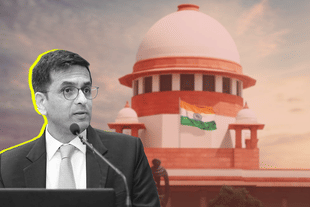News Brief
'I Practice My Faith, Don't Make No Bones About It': Former CJI DY Chandrachud Clarifies Remarks On Ayodhya Verdict
Arjun Brij
Nov 27, 2024, 02:10 PM | Updated 02:10 PM IST
Save & read from anywhere!
Bookmark stories for easy access on any device or the Swarajya app.


Former Chief Justice of India (CJI) DY Chandrachud clarified his earlier remarks about seeking divine guidance during the Ayodhya Ram Janmabhoomi-Babri Masjid dispute, stating they were "completely misconstrued." In an exclusive interview with ANI, he reiterated that the Supreme Court’s decision in the case was rooted in constitutional principles and not influenced by religious beliefs.
Chandrachud explained that his comments about prayer and meditation were made in response to a query about maintaining composure amidst judicial conflict. Recounting the incident, he said the question arose during his visit to his ancestral village, Kanersar, near Pune. Addressing the villagers, he shared how daily meditation and prayer provided him with inner calm, but stressed that such practices never interfered with his judicial duty to uphold the Constitution and the law.
Regarding the Ayodhya judgment, Chandrachud emphasized that the ruling showcased the application of legal and constitutional principles to resolve a complex, centuries-old dispute that had deeply impacted India’s social fabric. He explained that the judgment was a collective effort by the five-judge bench, which deliberately chose not to attribute authorship to underline their unanimity on the matter.
Reflecting on the broader responsibilities of judges, Chandrachud discussed how they often deal with emotionally charged cases, from familial disputes to conflicts between governments. He acknowledged that maintaining impartiality requires not only legal expertise but also a commitment to treating all individuals and faiths equally under the law.
He elaborated on the concepts of being "Dharmic" (ethical) and "Adhyatmik" (spiritual), distinguishing these from the idea of "dharma nirpekshita" (secularism). According to him, judges are trained to apply the law without being influenced by the religious identities of those involved in cases. Chandrachud stressed that a judge’s faith, or lack thereof, does not compromise their ability to deliver justice impartially.
"I don't make no bones about it. I practice my faith. I derive a great deal of comfort and solace from being a person who practices my faith. But what I want to also emphasise is that your ability to do justice in court and in terms of the constitution, and the law does not depend on whether you are an atheist to be truly, to be truly dispassionate," he said.
Responding to earlier speculation, Chandrachud noted that the Ayodhya case posed a significant challenge to the judiciary, given its potential to polarise the nation. He reiterated that the decision to speak with a single judicial voice aimed to underscore the bench’s collective resolve in addressing this sensitive issue.
The Supreme Court’s unanimous verdict in November 2019 awarded the disputed 2.7-acre site to a government-appointed trust for constructing a Ram temple, while also directing the allocation of a separate five-acre plot for a mosque. Chandrachud highlighted the judgment as an example of the judiciary’s role in resolving deeply entrenched conflicts while adhering to constitutional principles.
Arjun Brij is an Editorial Associate at Swarajya. He tweets at @arjun_brij





